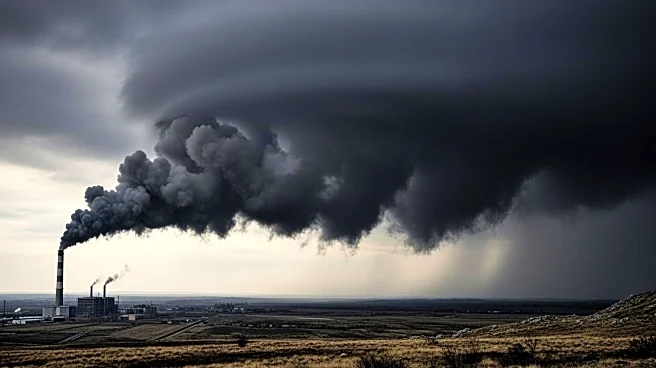What's Happening?
A new interactive map from Climate Trace reveals that fossil fuel burning is threatening the health of 1.6 billion people worldwide. The map shows that particulate matter, PM2.5, and other toxins are being emitted near the homes of these individuals, with 900 million living near 'super-emitting' industrial facilities. These facilities include power plants, refineries, and mines, which contribute significantly to air pollution. Former US Vice President Al Gore emphasized the link between fossil fuel emissions and health, noting that these pollutants cause the deaths of 8.7 million people annually. The Climate Trace tool aims to identify communities most at risk and highlight the urgent need for action.
Why It's Important?
The data underscores the severe impact of fossil fuel emissions on public health, particularly in urban areas. Air pollution from these emissions is linked to respiratory diseases, cardiovascular problems, and premature deaths. The findings highlight the need for policymakers to address the environmental and health consequences of fossil fuel use. As global leaders meet for the UN General Assembly, the issue of air pollution and climate change is expected to be a key topic of discussion. The Climate Trace tool provides valuable insights for governments and organizations to prioritize interventions and reduce emissions.
What's Next?
The release of the Climate Trace tool may prompt increased advocacy and policy efforts to combat air pollution and transition to cleaner energy sources. Governments and environmental groups may use the data to push for stricter regulations on industrial emissions and promote renewable energy projects. The upcoming COP30 climate summit in Brazil presents an opportunity for international collaboration and commitments to reduce fossil fuel dependency. Public awareness campaigns and community engagement initiatives could also play a role in driving change and encouraging sustainable practices.
Beyond the Headlines
The focus on air pollution as a public health crisis highlights the intersection of environmental and social justice issues. Vulnerable communities, often marginalized and with limited access to healthcare, are disproportionately affected by pollution. Addressing these disparities requires a holistic approach that considers economic, social, and environmental factors. The data from Climate Trace could serve as a catalyst for broader discussions on equity and sustainability, encouraging stakeholders to prioritize the health and well-being of all populations.










